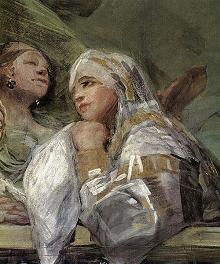Miracle, Mystery and Authority
 The only three factors that motivate people, according to Dostoyveyski are miracle, mystery and authority.
The only three factors that motivate people, according to Dostoyveyski are miracle, mystery and authority.
One of the greatest writers in world literature was the Russian novelist Dostoyevsky whose profound insight into human nature is most succinctly captured in his statement about the only three things by which the typical person is truly moved: mysticism, miracle and authority. The writer hopes to be able to relate these three primary motivations to his spiritual path and explain something of the perceived connection between these principles and the material in this work.
Can we first consider the inter-connectedness between the three? Could they be seen as three faces of one primary urge: the urge freely to create creation in God's name? Is it self evident that we are with this study, concerning ourselves with religion (whose auspices most certainly include miracle and mysticism and, as a social phenomenon, authority too)? Then we ask: what is religion, its purpose and practices, and the extent to which it achieves its purposes with its practices?
One would hope to be able to affirm that its primary purpose is to bind back its adherents to Universal Truth, and that its practices are designed to lead in that direction and only in that direction. We can easily accept that there are many paths which lead from separation to Unity and so there are many religions which teach different practices - yet we would hope that these practices would have some similarities, especially the closer we get to Unity. Happily we find this to be the case, that even when very different forms of religion are examined with the consciousness of a mystic it can be seen that the essential message is repeated again and again.
The mystic has an equivalent mystical insight whatever his or her religious background. Affirming this, Hazrat Inayat Khan has given us the message emphasising the unity of religious ideals. A mystic seeks direct experience of Unity and is given to practices which have the effect of lightening his vibration, reducing his involvement in the worldly and softening his sense of self in order to surrender to God.
Miracles are reported to have occurred on numerous occasions throughout history and are generally associated with saints, prophets and masters. There clearly is the expectation that a miracle in some way is related to the mystical leanings of the miracle-worker, that this person is already a mystic and is demonstrating a certain level of attainment by intending to create a change in material world phenomena which goes against our perception of natural law. These types of events are recorded in Buddhism, Hinduism, Judaism, Sufism, Islam, Christianity, Shamanism and so on. In some cases the more prosaic word magic is used to describe the event - a magician being one whose capability to focus "supernatural" powers results in unusual physical manifestations against the expectations of ordinary reality. Such a magician would most certainly have to have been engaged in practices that enable him to control mind, body and breath, very similar to those of the mystic. In fact it is argued that mystic and magician are actually engaged in the same activity, one focuses more away from the earth, the other towards the earth and each can expect to reach a stage of competence in both states of awareness when each can annihilate his ego in meditation and each can bend the accepted laws of the physical world.
Authority is an expression of identity. It is the "I am" of an organisation, that which identifies it as what it is, in other words the reach of its influence, the extent and limit of its power. Whether this organisation is an institution or an individual, these ideas seem to apply, a person having a well developed sense of identity exudes an aura of authority and is more able to influence and less ready to be influenced by the overpowering authority of another. It is interesting to note that the phrase "…in the name of…” is a declaration of authority as well as an invocation - and a mystic would consider it a practice of attunement (Bismillah, Beshemi, Shema). It is also noteworthy that certain words which appear to be statements of authority can also been seen as mystical affirmations ("Inana" of Jesus", "I am .... that which shapes" of Amairgin, and "I and I" of Rastafarian linguistic structure).
Therefore a link can be drawn between principles of authority, mystical awareness and magical capability and one can use the model of an hourglass to good effect. Looking away from the earth, the mystic is empowered by the authority of God, looking towards the earth the magician is empowered by the authority of self. Authority here is the strait gate of self - God - knowledge. Know yourself and you shall know God.
About The Author
Jason Randhawa
Free Questionnaires and Mini Courses are available on the 7 Words website (http://www.7words.co.uk), interactive fun with the “satisfaction index calculator” at http://www.7wordsassociates.org/psychology_spotlight.php
Visit the author's web site at:
http://www.7words.co.uk
[an error occurred while processing this directive]
Home » Mysticism Websites » Unique Mysticism Articles
» Miracle, Mystery and Authority



 Articles
Articles